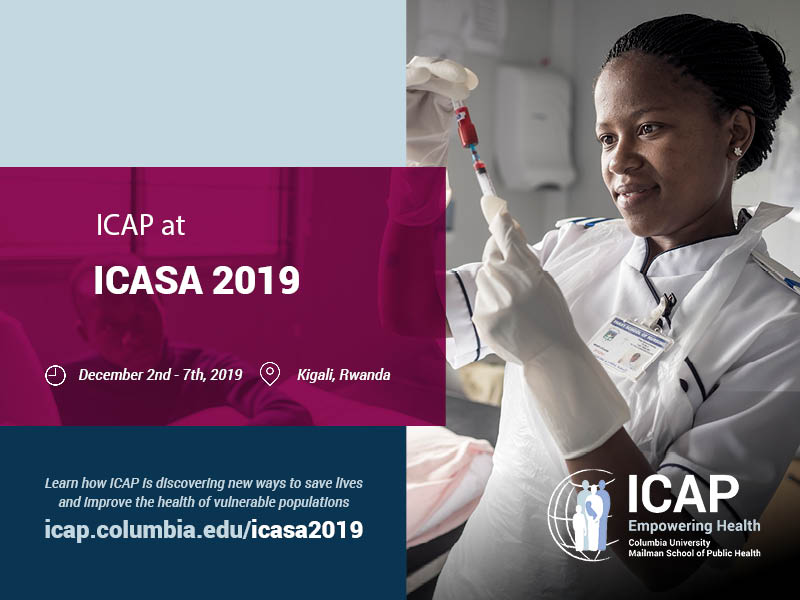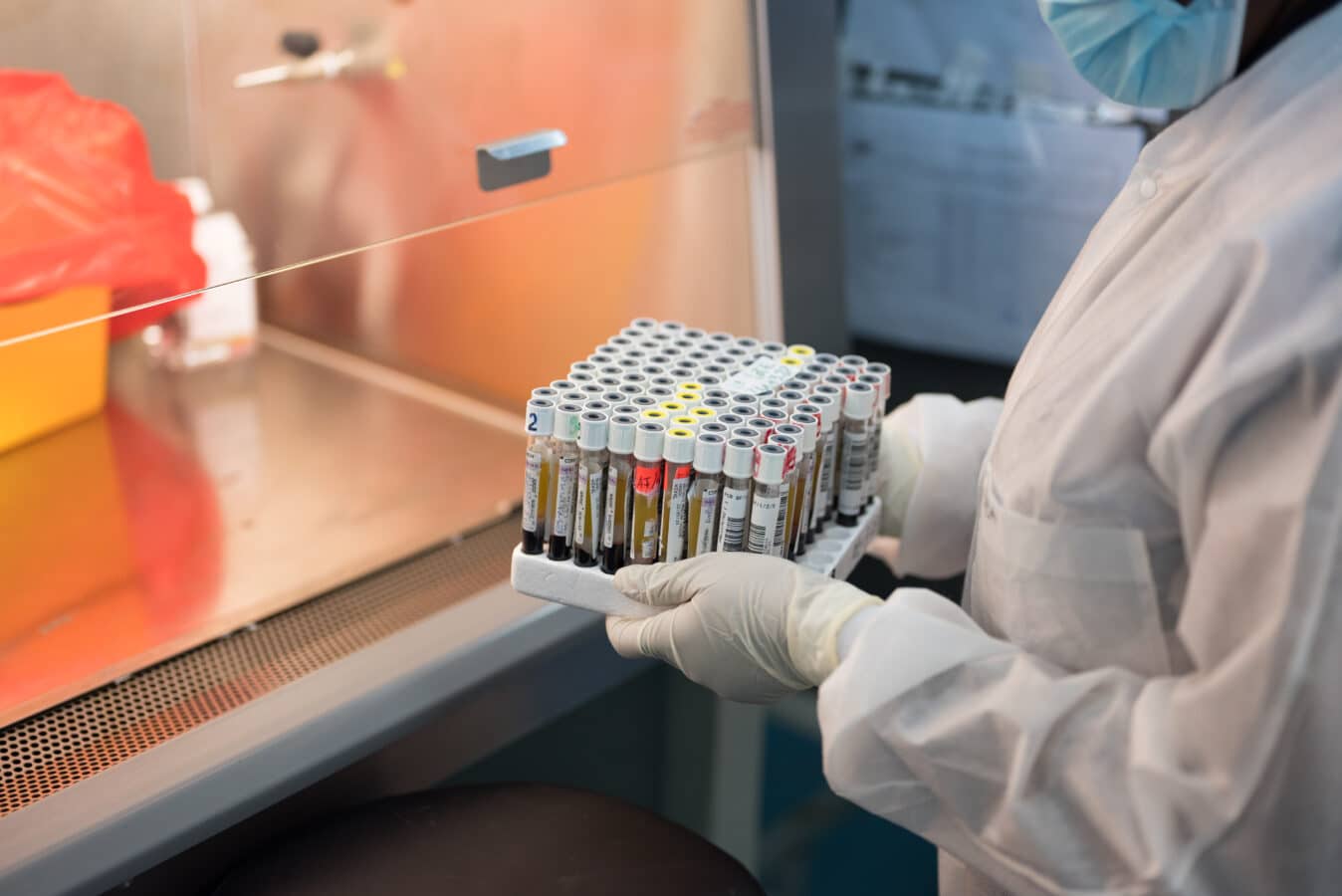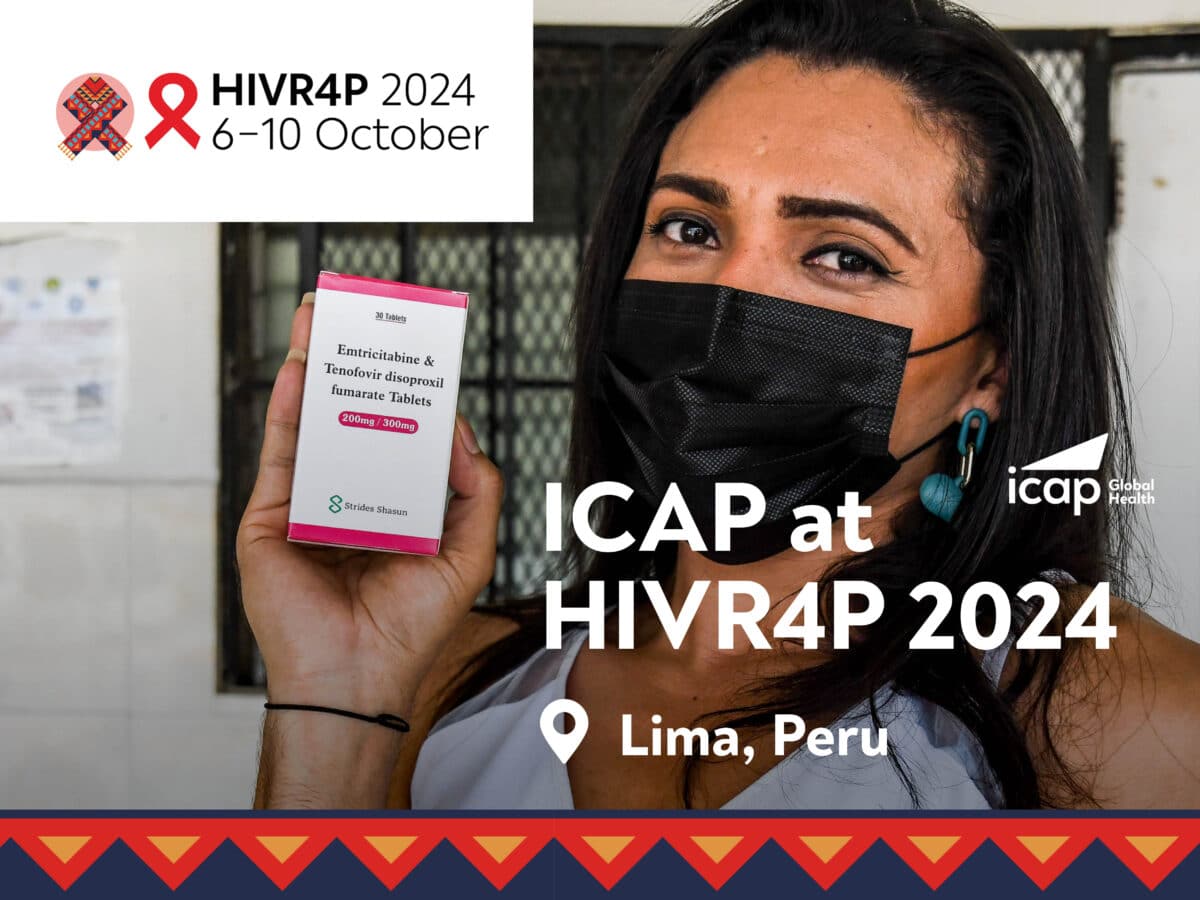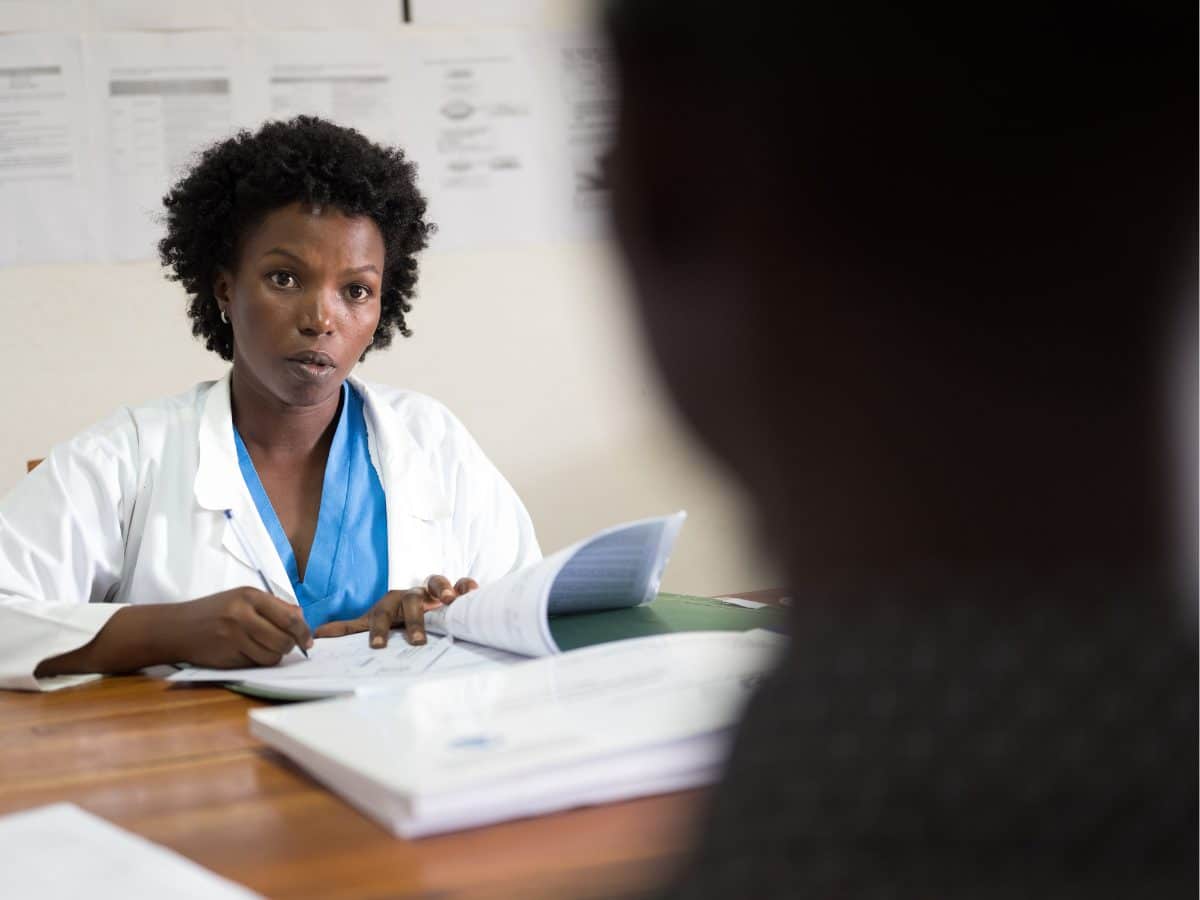-
Date: December 2-7, 2019
-
Location: Kigali Convention Centre, Kigali, Rwanda
The 20th International Conference on AIDS and STIs in Africa (ICASA) will take place in Kigali, Rwanda, at the Kigali Convention Centre from Monday, December 2 through Saturday, December 7, 2019.
ICAP Founder and Global Director Wafaa El-Sadr will present a plenary discussion. ICAP staff will present oral presentations and poster sessions, and host satellite sessions. See below for full list of ICAP activities.
Click for full conference information.
Jump to Poster Sessions.
Plenary:
- Wednesday. December 4 | 8:45 a.m. – 10:15 a.m.
“Integrating HIV Care with emerging infectious, comorbidities and NCDs”
Wafaa El-Sadr, Founder and Global Director of ICAP at Columbia University
Pre-Conference Satellite:
- Monday. December 2 | 9:30 a.m. – 4:00 p.m.
Remarks on “Start Free Game Changers” to be delivered by Fatima Tsiouris of ICAP at Columbia University
“START FREE, STAY FREE, AIDS FREE: Meeting the 2020 HIV Targets for Children, Adolescents, and Young Women: remaining roadblocks and potential game-changers”
Satellite Symposia:
-
- “ICAP at Columbia University: General and Key Population Surveys: Why are they needed and what can they teach us?”
Full agenda and summary on ICAP’s ICASA 2019 page
Tuesday, December 3 | 7:00 a.m. – 8:30 a.m.
Moderator: Gene MacDonald, CDC Rwanda
Speakers Include: Hon. Minister Diane Gashumba (TBC), Rwanda; Ambassador-at-large Deborah L. Birx, PEPFAR; Wafaa El-Sadr, ICAP; Jessica Justman, ICAP; Melchiade Ruberintwari, FHI 360; Sabin Nsanzimana, RBC Rwanda
Panelists Include: Peter Ghys, UNAIDS; Solange Baptiste, ITPC; Chinedu Osita Agbakwuru, University of Maryland; Veronicah Mugisha, ICAP
Breakfast will be served
- “ICAP and Rwanda Biomedical Center: HIV drug resistance (HIVDR) survey implementation in Africa: implementation experience and evidence for policy decisions”
Full agenda and summary on ICAP’s ICASA 2019 page
Tuesday, December 3 | 6:30 p.m. – 8:30 p.m.
Co-Chairs: Bereket Alemayehu, ICAP; Juliana de Fatima Da Silva, CDC Atlanta
Moderators: Amithab Suthar, CDC Atlanta; Gentille Musengimana, Rwanda RBC
Speakers Include: Bereket Alemayehu, ICAP; Zandi Mnisi, Eswatini Ministry of Health; Eric Remera, Rwanda Ministry of Health, RBC; Etienne Mpabuka, Rwanda Ministry of Health, RBC; Tapiwa Tarumbiswa, Lesotho Ministry of Health; Heiner Bucher, University of Basel, Switzerland; Juliana de Fatima Da Silva, CDC Atlanta; Claude Muvunyi ICAP; Nathan Ford, WHO Geneva; Steve Kanters, WHO - “ICAP at Columbia University: Differentiated Service Delivery and Advanced HIV Disease”
Full agenda and summary on ICAP’s ICASA 2019 page
Wednesday, December 4 | 7:00 a.m. – 8:30 a.m.
Moderators: Wafaa El-Sadr, ICAP; James Hakim, University of Zimbabwe College of Health Sciences
Speakers Include: Peter Preko, ICAP; Carmen Perez Casas, Unitaid
Panelists Include: Carmen Perez Casas, Unitaid; Stella Kentutsi, National Forum of People Living with HIV/AIDS Networks in Uganda; Franck Boraud, ICAP in Côte d’Ivoire; Helen Bygrave, International AIDS Society; Hervé Kambale, Ministry of Health of Eswatini
Breakfast will be served
- “ICAP at Columbia University: General and Key Population Surveys: Why are they needed and what can they teach us?”
Abstract-Driven Sessions:
- Friday, December 6 | C2 – Epidemiology of HIV Co-Morbidity and Emerging Infections | 2:45 p.m. – 4:15 p.m.
2:45 p.m. – 3:00 p.m. (ICAP Presentation)
“Prevalence and Determinants of Hepatitis B and C in Rwanda” (FRAC2102) - Friday, December 6 | B3 – Co-Mobility and Tools | 2:45 p.m. – 4:15 p.m.
2:45 p.m. – 3:00 p.m. (ICAP Presentation)
“Linkage to Care in the Rwanda Population-based HIV Impact Assessment (RPHIA)” (FRAB2001) - Friday, December 6 | E6 – Why Every Woman’s Health Matters | 4:45 p.m. – 6:15 p.m.
5:10 p.m. – 5:25 p.m. (ICAP Presentation)
“Limited Use of Dual Contraception among Women of Reproductive Age in Eswatini” (FRAE2204)
Tuesday, December 3
Satellite: “General and Key Population Surveys: Why are they needed and what can they teach us?
Tuesday, December 3, 7:00 – 8:30 a.m.
Prudence Mabele (MH 2+ Corridor)
Breakfast will be served
http://www.professionalabstracts.com/icasa2019/iplanner/#/session/123
Organizer:
ICAP at Columbia University
Moderators:
Wafaa El-Sadr, ICAP
Sabin Nsanzimana, RBC Rwanda
Summary:
General and key population HIV surveys are essential to gathering the information needed to guide the HIV response. For generalized epidemics, nationally representative household surveys have measured HIV prevalence, incidence, and viral load measures. For key populations, integrated bio-behavioral surveys (IBBS) have provided critical data on such populations including risk behaviors, the size and location of these often hard-to-reach populations as well as HIV-related biomarkers. These surveys utilize different methodologies and implementation strategies. Both types of surveys can provide governments, funders, policymakers, program implementers, civil society groups and community members with a detailed picture of the current epidemics and can suggest whom to prioritize with HIV prevention and treatment services as well as how to best deliver these services. This satellite session will share key insights into rationale, methods and findings from population surveys, review lessons learned, and explore the ways in which the data generated can change the course of epidemics and save lives.
Agenda:
- 7:00 – 7:15: Welcome and Objectives of the Session
Hon. Minister Diane Gashumba, Rwanda
Wafaa El-Sadr, ICAP
- 7:15 – 7:25: Introduction
Ambassador-at-Large Deborah L Birx, PEPFAR - 7:25 – 7:40: General Population Surveys: Rationale, Methods and Lessons Learned
Jessica Justman, ICAP - 7:40 – 7:50: Key Population Surveys: Rationale, Methods and Lessons Learned
Melchiade Ruberintwari, FHI 360 - 7:50 – 8:00: Use of Survey Results to Inform Policy and Programs
Sabin Nsanzimana, RBC Rwanda - 8:00 – 8:30: Panel Discussion moderated by Gene MacDonald, CDC Rwanda
- Peter Ghys, UNAIDS
- Wame Jallow, ITPC
- Chinedu Osita Agbakwuru, University of Maryland
- Veronicah Mugisha, ICAP
Satellite: “HIV drug resistance (HIVDR) survey implementation in Africa: implementation experience and evidence for policy decisions”
Tuesday, December 3, 6:30 p.m. – 8:30 p.m.
Kigali (Auditorium)
http://www.professionalabstracts.com/icasa2019/iplanner/#/session/221
Organizer:
ICAP at Columbia University
Co-Chairs:
Bereket Alemayehu, ICAP at Columbia University
Juliana de Fatima Da Silva, CDC Atlanta
Moderators:
Amithab Suthar, CDC Atlanta
Gentille Musengimana, Rwanda RBC
Summary:
Rising levels of drug-resistant HIV as a consequence of the expansion of access to antiretroviral treatment services poses a great challenge to control of the HIV epidemic in Africa. Consequently, the World Health Organization (WHO) recommends that scale-up of antiretroviral treatment programmes is always accompanied by a robust assessment of HIV drug resistance (HIVDR) emergence and transmission, and surveillance was identified as one of the five strategic objectives of the HIVDR Global Action Plan 2017–2021. To achieve this, the WHO has developed a generic surveillance protocol to facilitate the collection of timely and accurate nationally representative HIVDR data to better detect trends and improve programme planning and decision making. While several countries have implemented the survey using the standardized and nationally-representative methodology recommended by WHO, many other countries have insufficient technical capacity in their national HIV program to implement the survey. ICAP at Columbia University, in collaboration with the US Centers for Disease Control and Prevention and ministries of health, has developed and implemented HIVDR surveys based on the WHO recommendations to measure, at a population level, both transmitted and acquired HIVDR in several African countries. It is essential that HIVDR data and lessons learned from these implementations and others are shared to build capacity and guide future survey implementation.
Presentations:
- Framing remarks and introduction to the session by the Co-chairs
Bereket Alemayehu, ICAP - National HIVDR Survey implementation and public health actions: Results and lessons learned from Eswatini
Zandi Mnisi, Eswatini Ministry of Health - National HIVDR Survey implementation and public health actions: Results and lessons learned from Rwanda
Eric Remera and Etienne Mpabuka, Rwanda Ministry of Health, RBC - National HIVDR Survey implementation and post-survey activities: Results and lessons learned from Lesotho
Tapiwa Tarumbiswa, Lesotho Ministry of Health - HIVDR surveillance activities in the European region: Results and lessons learned from Switzerland
Heiner Bucher, University of Basel, Switzerland - Q&A session
- HIV drug resistance surveillance in PEPFAR: adapting methodology to meet programmatic needs
Juliana de Fatima Da Silva, CDC Atlanta - ICAP’s approach and experience in building capacity for the HIV Drug Resistance survey: Protocol development, survey implementation and post-survey activities
Claude Muvunyi ICAP - HIV DR survey as source of evidence-based recommendations for HIV treatment guidelines: Guiding principle and implementation considerations
Nathan Ford, WHO Geneva and Steve Kanters, WHO
Wednesday, December 4
Satellite: ICAP at Columbia University: Differentiated Service Delivery and Advanced HIV Disease
Wednesday, December 4, 7:00 – 8:30 a.m.
Cheick sidy Modibo Kane (MH 1)
http://www.professionalabstracts.com/icasa2019/iplanner/#/session/43
Organizer:
ICAP at Columbia University
Moderators:
Wafaa El-Sadr, ICAP at Columbia University
James Hakim, University of Zimbabwe College of Health Sciences
Summary:
In recent years, differentiated service delivery (DSD) models have been developed to improve the quality and efficiency of HIV programs. Much progress has been made in designing efficient and people-centered DSD models for patients who are doing well on treatment. In contrast, there has been less innovation about service delivery for patients with advanced HIV disease who still comprise almost one-third of people initiating ART. ICAP at Columbia University is a leader in the design, development, implementation and evaluation of HIV programs, working hand in hand with Ministries of Health (MOH) and diverse partners. ICAP’s HIV Coverage, Quality and Impact Network (CQUIN) brings countries together to share DSD innovations and to work together towards sustainable high quality HIV programs. This satellite will convene implementers from MOH, PLHIV organizations, implementing partners, donors and other stakeholders. Using an interactive panel format, the session will highlight the importance of DSD for advanced HIV disease and showcase innovations and global best practices.
Agenda:
- 7:00 – 7:15: Welcome and Introductions
Wafaa El-Sadr, ICAP - 7:15 – 7:30: Advanced HIV Disease: Where are we now?
James Hakim, University of Zimbabwe - 7:30 – 7:40: The CQUIN Learning Network Call to Action
Peter Preko, ICAP - 7:40 – 7:50: The Unitaid/CHAI AHD Initiative
Carmen Perez Casas, Unitaid - 7:50 – 8:00: Q&A
- 8:00 – 8:30: Panel discussion moderated by Dr. Hakim & Dr. Preko
- Stella Kentutsi, National Forum of People Living with HIV/AIDS Networks in Uganda
- Carmen Perez Casas, Unitaid
- Franck Boraud, ICAP in Côte d’Ivoire
- Helen Bygrave, International AIDS Society
- Hervé Kambale, Ministry of Health of Eswatini
Friday, December 6
Abstract-Driven Session: B3 – Co-Morbidity and Tools
Friday, December 6 | 2:45 p.m. – 4:15 p.m.
Linkage to Care in the Rwanda Population-based HIV Impact Assessment (RPHIA) | 2:45 p.m. – 3:00 p.m. (ICAP Presentation)
Prudence Mabele (MH 2+ Corridor)
http://www.professionalabstracts.com/icasa2019/iplanner/#/presentation/91
Presenter: Collins Kamanzi, ICAP
Abstract-Driven Session: C2 – Epidemiology of HIV Co-Morbidity and Emerging Infections
Friday, December 6 | 2:45 p.m. – 4:15 p.m.
Prevalence and Determinants of Hepatitis B and C in Rwanda (FRAC2101) | 2:45 p.m. – 3:00 p.m.(ICAP Presentation)
Kigali (Auditorium)
http://www.professionalabstracts.com/icasa2019/iplanner/#/session/115
Presenter: Veronicah Mugisha, ICAP
Abstract Driven Session: E6 – Why Every Woman’s Health Matters
Friday, December 6 | 4:45 p.m. – 6:15 p.m.
Limited Use of Dual Contraception among Women of Reproductive Age in Eswatini (FRAE2203) | 5:10 p.m. – 5:25 p.m. (ICAP Presentation)
Prof. Madeleine Okome (MH3)
http://www.professionalabstracts.com/icasa2019/iplanner/#/presentation/52
Presenter: Rumbidzai Ndungwani, CHAI. former ICAP
Poster Sessions:
- Tuesday, December 3:
- “Strengthening Human Resources for Health to Achieve Epidemic Control: A Case Study of the Democratic Republic of the Congo” (TUPEE321)
- “Awareness and Disclosure of Status and Undetectable Viral Load in HIV-serodiscordant Couples: Evidence from Population-based HIV Impact Assessments” (TUPEC112)
- “Factors Predicting Mortality among Patients Newly-diagnosed with Tuberculosis, Kisumu, Kenya” (TUPEC188)
- “Awareness and Likelihood of PrEP Use among Female Sex Workers in Kisumu, Kenya” (TUPEC158)
- “Morbidity and Mortality of HIV-infected Adults Admitted to the Medical Inpatient Service at a Public Tertiary Referral Hospital in Kisumu, Kenya” (TUPEC100)
- “Doubling Male Circumcision for HIV Prevention in Rwanda” (TUPEC102)
- “Improving TB Preventive Treatment Coverage and Completion in Sierra Leone: Quality Improvement Methods Enhanced Site-level Processes but Uncovered Above-site Procurement and Stock Management Barriers” (TUPEC185)
- “Concordance of Self-reported HIV Status and Detectable Antiretrovirals and Undetectable Viral Load in the Zimbabwe Population-based HIV Impact Assessment (2015-2016)” (TUPEC107)
- Wednesday, December 4:
- “Cost of Providing Prevention of Mother to Child Transmission (PMTCT) and Antiretroviral Treatment (ART) Services in Zimbabwe” (WEPEE357)
- “Reaching Men through Moonlighting HIV Services in Drinking Places in Chipata District in Zambia” (WEPEB056)
- “Increasing Access to Treatment through Community Antiretroviral Therapy Initiation Using Starter Packs in Eastern and Western Provinces in Zambia” (WEPEB057)
- “Unsuppressed Viral Load and Associated Factors in Rwanda: Results from a Nationwide HIV Survey, 2018” (WEPEC147)
- “Gaps in Awareness of HIV-positive Status among Adults 15-64 Years in Rwanda – The Last Mile to Achieving Epidemic Control in Rwanda” (WEPEC145)
- “A Quality Improvement Collaborative Markedly Increased Inpatient Provider-initiated Testing and Counseling and HIV Diagnosis at 10 Hospitals in Sierra Leone” (WEPEC211)
- Thursday, December 5:
- “Monitoring the Transition to New Antiretroviral Treatment Regimens through an Enhanced Data System in Kenya” (THPEE336)
- “Innovative Approaches at TEBA Points of Care to Provide Comprehensive TB and HIV Services to Miners and Their Families” (THPEE307)
- “Tableau to Improve HIV Testing and Coverage and Yield in Tanzania” (THPEE337)
- “Collaborating with the Media to Improve Public Perception of Key Populations in Zambia to Help with the HIV Response” (THPED304)
- “Missed Opportunities for TB Diagnostic Testing among PLHIV with TB Symptoms in Zimbabwe” (THPEA003)
- Friday, December 6:
- “Blood Pressure Self-monitoring Is Feasible and Acceptable for Adults with HIV and Hypertension in the Kingdom of Eswatini” (FRPEE377)
- “HIV Incidence by Age in Sub-Saharan African Men: Implications for Medical Male Circumcision” (FRPEC199)
- “HIV Incidence by Male Circumcision Status in Population-based HIV Impact Assessment (PHIA) Surveys from Eight Sub-Saharan African Countries, 2015-2017” (FRPEC201)
- “Reaching Adolescent Boys and Young Men through a Voluntary Male Medical Circumcision Program in Zambézia Province, Mozambique” (FRPEC221)
- “Rapid Improvement in HIV Diagnostic Coverage through Scale-up of Community Based Index Testing in the FIKIA Project, Tanzania” (FRPEC126)
- “Advanced HIV Disease, Viral Suppression and Missed Opportunities: Findings from the Zimbabwe Population-based HIV Impact Assessment (ZIMPHIA), 2015-2016” (FRPEB077








